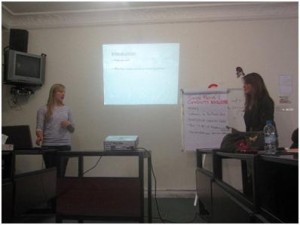Throughout my 6 months abroad, I have interned in two different international NGOs and am now a research assistant for a former professor of mine at the University of Jordan. As American college students, I think the importance of internship work before graduation has been drilled into our heads. The seemingly endless hours of unpaid stapling, summarizing, e-mail responding, with the occasional intense responsibility thrown in will pay off later down the road, right? Interning in the US is a great opportunity to gain valuable job experience in your field while networking for future opportunities. Think about pairing all of this with studying abroad.

Fellow JWU intern, Kelsey, and I giving a presentation on the importance of Social Media for non-profits and NGOs internationally.
Studying abroad isn’t all about making great local friends, finding the best bars, and seeing the sights. I personally have gained some of the best job experience I could have imagined despite ups and downs. First of all, interning isn’t such a big concept in many places, and it is really just starting to pick up in the Middle East. This means interns are usually given large, skill-honing responsibilities. For the brief time I interned at The Egyptian Center for Women’s Rights, I edited important reports on women’s rights issues that were translated from Arabic to English. At the Jordanian Women’s Union, I have been helping to set up the organization’s Facebook and Twitter page, did research on Jordan for the United Nations Development Programme’s Human Rights Watch website, and occasionally give English lessons. Now I am helping my professor write the first chapter of a new book about the Arab revolutions this past spring. Pretty cool, huh!?
Aside from these great opportunities, interning abroad has some more practical perks. Not only do you learn Egyptian or Jordanian culture, but you learn a new work culture and adaptability. Especially in the Middle East, you learn how social the office is, often feeling like one giant family. Interning abroad can also increase your vocabulary and professional speaking skills in the language you’re learning.Also, it teaches you how to work with what resources you have available and plan time accordingly – for example how to effectively research when wi-fi doesn’t exist everywhere or all the time.
If you can squeeze at least 6-10 hours of interning in your week while you’re abroad for several months, do it. While gaining valuable work experience, you learn how to adapt to different work environments, cultures, and language and make great friends along the way. At the very, very least it will most certainly be a resume booster. But I guarantee, despite occasional cultural frustrations, you will come out a better intern and future employee.
 Lauren Kardos is a rising senior at The George Washington University and intern at The National Society of Collegiate Scholars. As a student of International Affairs and Middle East Studies, she is currently studying abroad in Amman, Jordan, attempting to improve her Arabic. She loves blogging about her travel experiences, reading any and all books, and exploring new music.
Lauren Kardos is a rising senior at The George Washington University and intern at The National Society of Collegiate Scholars. As a student of International Affairs and Middle East Studies, she is currently studying abroad in Amman, Jordan, attempting to improve her Arabic. She loves blogging about her travel experiences, reading any and all books, and exploring new music.
